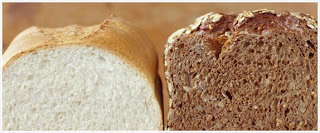
Whole grains play an important role in improving your overall good health. Besides fiber, whole grains also give you a number of vitamins and essential nutrients, including folate, iron, magnesium, selenium, thiamin, and riboflavin. Consuming three servings of whole grains are recommended each day can also help reduce the chance for you mengindap serious diseases, like heart disease, and can help maintain an ideal body weight.
Here are a variety of nutritional benefits obtained from whole grains:
Lower risk of heart disease.
A diet low in saturated fat and cholesterol as well as many foods are whole grains, such as Quaker Oats can reduce the risk of heart disease. Eat at least 3 servings of whole grains every day.
Encourage a sense of satiety, which is important for weight management.
Because whole grains are rich in fiber and complex karbohodrat, which is why full longer. Eat nutritious foods like whole grains is a smart thing to do when you try to control / control your weight.
Whole Grains and Diabetes Type 2.
Researchers today continue to evaluate the influence of diet rich in whole grains and its effect on the risk of type 2 diabetes.
Helping Your regular bowel movement
Diet of whole grains may help you urinate regularly and enhance a healthy digestive system. The fiber in whole grains helps promote weight "CHAPTER" and reduce the amount of time needed for the rest of your food through the intestines. This helps you to defecate regularly.
Reduce your risk of getting some types of cancer.
The content contained in whole grains in addition to helping protect you against heart disease also may help prevent some cancers, including stomach cancer, colon, and prostate. According to the American Institute for Cancer Research, the outer layer of whole grains contain phytochemicals, including lignans and phenols in high quantities that can fight cancer.
Whole grains and blood pressure.
The DASH diet (Dietary Approaches to Stop Hypertension) diet is recommended by health professionals to help maintain healthy blood pressure. This diet is a diet rich in a number of fruits, vegetables, low fat dairy products, and whole grains in large numbers. Research shows that whole grains in the DASH diet provides an important contribution to the overall nutrient intake, and also, specific nutrients are associated with positive effects on blood pressure.
No comments:
Post a Comment